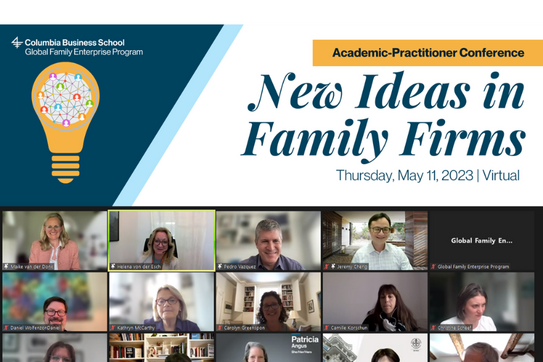Introduction: The New Ideas in Family Firms Conference is an invitation-only thought leadership platform that was launched in 2018 to bring together a small group of the world’s leading academic researchers and practitioners to discuss the latest ideas in family enterprise research and advisory work. The conference was founded jointly by the Columbia Business School Global Family Enterprise Program and INSEAD’s Wendel Centre for Family Enterprise in the spirit of collaboration—between the institutions and across disciplines—to bridge theory and practice in the area of family firms. In 2023, the Global Family Enterprise Program was the sole host of the conference, which was held online.
The New Ideas in Family Firms Conference was held virtually on May 12, 2023, with approximately 30 selected scholars and advisors from around the world. Conference Chair, Prof. Patricia Angus, Managing Director, Global Family Enterprise Program, Adjunct Professor of Business, Columbia Business School, and CEO, Angus Advisory Group LLC, kicked off the morning with a warm welcome and reminder of the collaborative, intimate nature of the gathering.
Daniel Wolfenzon, Nomura Professor of International Finance, Columbia Business School, then introduced Andrew Ellul, Professor of Finance and Fred T. Greene Distinguished Scholar, Indiana University Kelley School of Business, who presented the academic research paper: Entrepreneurs’ Diversification and Labor Income Risk, which he wrote with co-authors Jan Bena, Marco Pagano, and Valentina Rutigliano. The research focuses on whether entrepreneurs with diversified portfolios provide “labor insurance” (in this case meaning, briefly, fewer layoffs and income protection) during moments of “idiosyncratic shocks” (such as exchange rate fluctuations). Indeed, the findings show that employees are more protected when their company’s owner has significant ownership in other companies beyond the company for which the employee is working. This research builds on an age-old question and adds new insights.
Practitioners took the stage next. Helena von der Esch, Senior Family Advisor, Formue AS, moderated a panel on Myths and Challenges for Advising Families, featuring Jeremy Cheng, Researcher, CUHK Centre for Family Business, Founder, GEN+ Family Business Advisory & Research, CHUK & GEN+ Family Business Advisory and Research; and Maike van der Donk, Owner, Lime-Tree; and Pedro Vazquez, Associate Professor, IAE Business School.
Each practitioner shared the myths that they observe in their client families’ narratives, which often bring rise to false dichotomies, such as: the decision to join a family business is “either/or” or the belief that “my child/ grandchild is the greatest” or “my child is useless.” In each case, they observed the ways in which these myths limit the potential for families. They also agreed that it is challenging to work with client families who think that work can be done quickly, when in fact the timeframe is far longer than the client might hope. They acknowledged that advisors need to gain trust early on in a client engagement, and that they can’t “fix” all the clients’ problems – the most important work must be done by the clients themselves. All agreed they were tired of the myth of the “third generation curse.”
Next, Anete Pajuste, Professor of Finance, Stockholm School of Economics in Riga, Visiting Lecturer, Questrom School of Business, Boston University, and Board Chair, Baltic Family Firm Institute, shared research using a robust dataset from the Baltic countries of Estonia, Latvia, and Estonia. This region presents an interesting area of study because private property ownership is only a few decades old, and many family businesses are undergoing their first transition. The research is revealing that—in this context—family-owned businesses are outperforming non-family-owned businesses, and founder succession is taking longer than expected.
The gathering was then divided into small groups to focus on “what’s truly new” in the field of research and advising work for family firms. This led to a lively discussion when the entire group reconvened. The general theme seemed to be that change—in all dimensions—is accelerating, while complexity is growing both for families, their enterprises, and the advisory work they require. This highly experienced group of researchers and practitioners shared a common lament that the rest of the world has not yet caught up to the reality that family firms come in all sizes and are the primary form of business, major drivers in the capital markets, and dominate philanthropy worldwide. For researchers, this is reflected by an ever-elusive attempt to come up with a single common definition of “family business” or its larger sibling, the “complex family enterprise.” For advisors, the implication is that some families don’t even understand that they have a family enterprise.
The gathering ended with gratitude for the open exchanges across disciplines and across the world.
